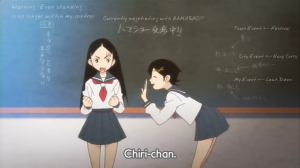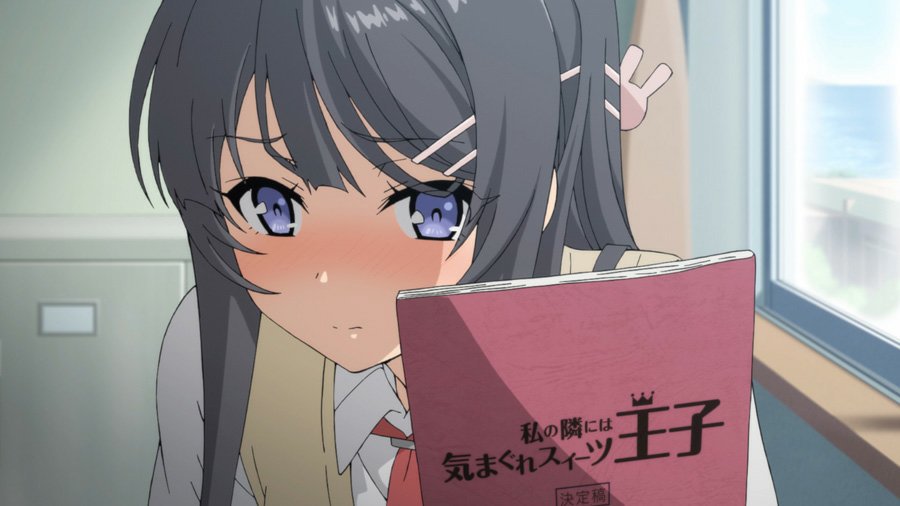 I am often confused about all the –kuns, –chans, and other name attachments in subtitles. These are called honorifics. They are roughly the same as our own Mister, Miss, Madam, and Sir. Although for the Japanese they tell a lot more about the relationships between people.
I am often confused about all the –kuns, –chans, and other name attachments in subtitles. These are called honorifics. They are roughly the same as our own Mister, Miss, Madam, and Sir. Although for the Japanese they tell a lot more about the relationships between people.
Honorifics are gender neutral, but some are used more for one gender than the other. Kun, for example, is used more for males while chan is for females. Honorifics are generally required when referring to someone, but sometimes they must be dropped altogether. It’s pretty confusing.
Not using an honorific or referring to oneself with one is considered poor speech. It can come off as clumsy or even arrogant. They are generally used when speaking directly to someone or when referring to a unrelated third party. Such as when you are talking about someone. David-san now has a girlfriend.
Dropping an honorific denotes intimacy with the person you are talking with. This is done with spouses, younger family members, very close friends, or social inferiors. They are also dropped when talking about a family member with a non-family member.
Honorifics are usually coupled with polite speech suffix -masa and desu.
San (さん) – this is the most common honorific. It is a title of respect between equals. It is the English equivalent of Mr, Miss, Ms. It can also be attached to animals and objects, but that usage considered childish. usagi-san translates roughly to Mr. Rabbit. It can also be used to refer to someone who works at a certain place. honya-san (“bookstore” + san) translates to “bookseller.”
Chan (ちゃん) – this suffix shows the speaker finds a person endearing. Using chan with a superior’s name is considered rude and condescending. Generally it is used for babies, teenager girls, young children, and grandparents. It can also be attached to animals. It denotes cuteness, lovers, close friends, or any young woman. Young women may use it to refer to themselves to appear cute and childish.
Kun (くん) – used by people of senior status to refer to people of junior status or by anyone when referring to male children or teenagers. Women may also used the term when referring to a guy they are emotionally attached or known a long time. Kun isn’t male exclusive, but mostly used for male references.
Sama (さま) -much more respectful than san. This term is used to refer to people much higher in status than oneself, customers, or someone you greatly admire. When used to refer to oneself it can either come off as supremely arrogant or self effacing depending on the context.
Senpai (せんぱい) – refers to people with more experience than oneself. Also used for higher grade classmates. So a junior in high school would call a senior senpai.
Kōhai (こうはい) – refers to a person as a junior. So a senpai may attach this to a junior’s name. This generally isn’t used.
Sensei (せんせい) – one of the most recognizable honorifics. It refers to someone who as attained a high mastery of something.
Shi (し) – used to refer to someone a writer hasn’t met. Only used in formal writing. It is used as shorthand to refer back to the person originally referenced as long as there is only a single reference.
Ue (上) – literally means “above”. It shows utmost respect. It is seldom used, but it is found in some phrases like chichi-ue and haha-ue. Reverent terms for father and mother. Or when referring to a nameless customer, ue-sama.

Phew. It’s pretty difficult to keep all these rules straight. Japan is a highly stratified society. These suffix help keep status and one’s opinion of others clear. Of course, the waters are muddied a little. Senpai-kohai relations may reverse in context to different clubs or organizations, depending on how long one or the other was in the organization.
Honorifics can be a quick shorthand to show how characters related to each other in anime…if you can keep them straight. However, good stories don’t have to rely on honorifics to show character relationships.




Chris Kincaid says:
November 1, 2020 at 9:47 am
Japanese society has done many evil things. But …. No society is innocent.
===
This is so true. Because no innocent society has ever survived and in the long run never will!
Just wait until we have to fight again for the earths recources……
This practice of referring to people according to their position, gender, and age has contributed greatly to the composition of the Japs’ class society.
The Japs had unconsciously come to revere people who were older, male, and arrogant.
Even today, the Japs are still a barbaric nation of seniority and phallicism.
This is not a culture, it is just proof of the barbarism of the Japs.
The idea of honorifics comes from ancient China. If you’ve read into Japanese history, you would know that their society began as a matriarchal society and gradually developed into a more male-centric society. However, even with the male centeredness, women could still own property and retained some rights up through the Edo period. Japanese society is not a barbaric culture. It is just a culture like any other. A barbaric culture is one that disparages and fails to understand others.
The Japs have grown up in an environment where their own people are their greatest enemy, having been in a consistent civil war and cold war since the founding of the country.
We have fostered a culture of losing the boundaries of self and others and going with the strong.
They sent troops into Korea, occupied the Ryukyu Kingdom, massacred the Ainu people, and so on.
In addition, they repeatedly committed atrocities against the Asians during WW2, and they have not acted to repent for it after the war.
I have never understood why such a nation is being lifted up in the shadow of Hitler.
ちなみに私はジャップです。
True. Japanese society has done many evil things. But most societies have done similar things in the past. American society has committed genocide on Native Americans. No society is innocent.
America has not committed genocide against the Native Americans. The whole small pox blanket is a myth. America got into wars with the natives but there was no genocide.
I wish the small pox blankets were heresay. However, we have letters of people who, at the least, considered it:
My hometown sits in what was called “The Bloody Valley” because of the massacres that happened there. You are right about America and England going to war with the Native Americans, but that war soon became genocidal in my hometown’s area and with marches like the Trail of Tears.
Source
Weslager, C.A. The Delaware Indian Westward Migration. Pennsylvania, Middle Atlantic Press, 1978.
me gay? please help
If you are gay, I suspect the same rules apply with honorifics. Use -san until you are closer. Then use -kun or drop the honorific for your partner’s first name. You can always ask for their preference too.
A female close friend of mine, who is younger than me, is calling me kun nowadays. Is there a meaning to this? Because she usually referred to me as san.
It could be she feels closer to you and more comfortable with you. Enough at least to step down from the formality of -san.
wait so if you use -chan, it’s for someone younger or your intimate with, or younger females. Yet I’ve heard of Onii-chan which supposedly means older brother, how does that work?? Could you explain?. Thank you
Think of -chan as a term of endearment. Oniichan falls into this category. It makes the speaker seem cuter, so you will sometimes hear -chan attached to animals–neko-chan, usagi-chan, inu-chan–so the speaker appears cuter and younger.
I’m not an expert, but I think ‘chan’ is mostly used for close friends and family members
It is mostly used in that context.
hello im in love with Japanese culture and especially with their way of doing things.I would like to learn all about it and I hope i will learn all honorifics.
Japanese culture has a lot of positives, but it also has a lot of negatives too. Have fun on your learning journey!
What do you call someone who you both have an interest in each other? Like, you are both dating?
It depends on setting and closeness of the relationship. If they are in public or even professional, -chan, -kun, -san, may all be appropriate. If they are alone or with a friend group, a first-name basis may be better.
I’m writing a scene for a book where three classmates are talking for the first time, it’s a new school year for them and wanted to know what honorific they would use, especially if they are going to become friends.
You can start with “san” and as they become friends shift to “chan” or “kun” or, in private, first names.
Hi! I’ll have my japanese students next week. I am confused about the honorifics since we’re about the same age.
Can someone please specify what should I call them? Especially the girls. Should I use “chan”?
Because you are a teacher, I suspect “chan” would work fine. Despite being near the same age, as a teacher, you are a notch above them socially in the classroom. If you used “san,” you show more respect, but it is also more formal and equitable. Guys would be “kun” or “san.” Keep in mind that I also find honorifics confusing! Best of luck with your students.
I’m trying to write a situation where an adult woman compliments a young female teen for something and attaches -san to the teen’s last name. To expand the context a bit, the woman holds the teen in high regards despite only having met each other. Is this normal? Or would another honorific be better? Should the teen also address the woman with -san attached to the woman’s last name? And should you add an honorific when you recognize someone and ask for confirmation? Like saying “You’re Honda Akane-san, right?”
She would address the teen as -kun or -chan depending on gender. The teen would refer to her as -san. At least in public.
They would use the last name only from what I’ve observed. So: “You’re Honda-san, right?”
I hope this helps!
Thank you! I’ve been a little stuck on that. Thanks for the help.
Something I’ve never understood about kun & chan & last name/first name status.
Lupin III refers to his kinda-but-not-really-girlfriend / bootycall rival / backstabbing sometimes-ally as “Fujiko-kun.”
When he married Rebecca Rossellini, she never referred to Lupin by first name.
His best friend Daisuke & he are on a last-name basis. He has taken bullets for this guy. He also calls him “Jigen-chan.”
Goemon Ishikawa is super formal & not particularly friendly, but he’s put on a first name basis early on.
I also find honorifics inconsistent. I’m not certain if their use by authors reflects character or just conventions when the work is written or even just the author’s proclivities.
How would an adult man use an honorific to address another adult man? In the situation in my story that I’m writing, they just agreed to go on a first name basis, but they aren’t close enough to drop the honorific in their name. Would I continue to use -san, or use -kun?
I would continue using -san unless they have a senpai-kohai relationship. In that case, the senpai might use -kun for the kohai.
Hello, I am hosting a Japanese exchange student. She is a 17 year old Japanese female, and I am a 16 year old American male. I am writing a letter to her a week before she comes to the United States. I can’t decide whether to use Chan or Senpai in the aisatsu… Any advice?
Well, she is your senior so -senpai or -san would be proper. But it depends on how she feels. She may prefer the more familiar -chan. The best course of action is to ask her which she prefers. If you can’t do that, just fall back on -san.
Thanks a bunch 🙂
my girlfriend is half Japanese and i want to impress her by using honorifics.
what should i call her? also she is younger than me.
-chan would be the best honorific.
Yes, “chan” would be correct and show the right affection while sounding very cute. Even if she was the same age or even a little older it is still best to use “chan”.
Very much impressive blog keep the good work up. I found this very informative. It helps me a lot. Love to wait for your next post.
Thank you. I’m glad you enjoy JP.
Since you are close friends it can be whatever you want. Many friends have pet names they call each other throughout their lives. Just ask him what he wants and tell him what you want too.
However, if you are speaking about each other to adults, you should use the more formal -kun and -chan or even -san if the situation is far more formal. Using pet names in those cases isn’t acceptable even here in the US.
Hi! This is a really good article. Thanks for sharing.
You can usually refer to a senpai just by calling them “senpai” and whoever you are talking to would understand who are refering to. But “kouhai” is never used like what I described above – it’s purely an adjective to describe the position of a junior student. Since kouhai is not used behind a person’s name, how should a senpai address a kouhai? Is it “surname-san”?
For the most part, a senpai seems to use “surname-san” or a diminutive -kun or -chan if asserting your superior social rank or are close to the person you are addressing.
Hi!
Do you know how a high school male and female student of the same classroom would address each other (formally)? And how would a male and female address another male who’s in the same year, but in a different class?
Thank you so much!
Oh, I meant “class” in the first sentence.
Formally: they would use surname-san. Between classrooms it would remain this convention. Now if they were in a fairly casual situation and knew each other well, they would use surname-kun (a girl addressing a male friend) or surname-chan (a guy addressing a female friend) or drop the honorific altogether. Girls may use -chan and -kun regardless of closeness if they want to appear cute. Only super close friends and lovers would use their first names publicly.
I asked this question because my Japanese textbook says that in a formal situation, a female high school student should address a fellow male classmate as “surname-kun”. There’s even a dialogue to demonstrate the use of honorifics that goes like this:
[First Meeting At School – Formal Dialogue]
(Girl) Ikeda Ayaka: Nice to meet you, Tanaka-kun.
(Boy) Tanaka Hiroki : Thank you. It’s very nice to meet you as well, Ikeda-san. Can I come sit next to you?
–
I was confused because I know that people, regardless of gender, should use “-san” as a rule of thumb in formal situations, especially with someone they do not know. I searched about the topic in the internet anyway, and I found two (unrealiable) sources confirming what my textbook said. Now, you’re saying “-san” should be used like I thought, and I’m even more confused. lol
Do you have some reliable sources about this to help me understand it better?
Thanks!
I get confused with honorifics as well, and I noticed I’m not entirely on the mark with my answer. Here’s an updated answer and the citation for the linguistic paper that supports it:
-kun is used to address men who are younger or the same age as the speaker. Men may use the suffix to address women who are socially inferior. -kun can be attached to surnames and given names. However, it is less polite than -san. It isn’t used between women or when addressing superiors. -kun shows intimate relationships among the participates or shows the addressee is subordinate to the speaker. It is consider both formal and informal.
-san is used for both male and female names, surname or given. It shows the addressee has higher status than the speaker and can show distance and respect for the addressee.
Mangga goes on to say that in-group people (ie students) can address each other using -chan and -kun but cannot politely address an outsider using those suffixes (they have to use -san). So if the girl addresses a boy who is a student (the same in-group) who is equal in age or younger than she is, then -kun is correct. If the boy isn’t a student (or otherwise an outsider) and/or older than she is, she should use -san.
—
According to the study, my answer is incorrect. It depends on several other factors as I list. As a guy, I would err on the side of caution and avoid the use of -chan and use -san, but I would ask her which honorific she would prefer. This likely doesn’t help answer your question, but in one of my Japanese language books, it simply tells Westerners to ask which honorific the person prefers and use that.
I hope this helps!
Reference
Mangga, S. (2015). Variety using of Address Forms in Japanese Society in Perspective of Sociolinguistics and Anthropological Linguistitics.Parole Journal Of Linguistics And Education, 5 (1) 67-73. https://doi.org/10.14710/parole.v5i1.8535
Thank you, I am currently writing a Japanese based story, And this helped me understand.
I’m glad you find this helpful. Although if you are writing for an English-speaking audience, you can drop honorifics and simply refer to the characters via their last name or as Mr. and Miss. It has the same effect as honorifics but increases readability. Just depends on what you want to do.
This article was so helpful…
But was Usagi-san (Mr. Rabbit) a reference to the Junjou Romantica series? ;3
I didn’t mean for it as a reference; the phrase is common, but it could be 😉
Thank you Chris-shi!
Thanks japanpowered~senpai!~
いえ ^_^
Hi! I agree with Kazumi Mikuzi, out of all the articles I read, this was the best one. By far.
Um, I was wondering after reading your article on relationships and dating… Is it possible for japanese people to refer to themselves as husband and wife even though they’re not married (by law or ceremony) ? This is a common thing to say in my country when you feel the relationship is more serious than just boyfriend and girlfriend . For example love wise, or when you have a kid or you live together. And so on. So I was wondering how much different we are regarding our culture.
Also, would you be kind enough to tell me what this means: ジャー I understand it’s pronounced Jā (a long A)
Could it be an Honorific? Cause I read it right next to a name. Thank you so much in advance.
I am glad you enjoyed the article!
I couldn’t find specific information about what long-term couples call each other besides the following:
kare which means “him” or “boyfriend”
kanojo which means “her” or “girlfriend”
garufurendo — Japanese transliteration of “girlfriend”
boifurendo — Japanese transliteration of “boyfriend”
So I venture to say it is not common to call long-time dating partners wife or husband. In my part of the United States, these terms are also specific to those who are formally married. My aunt and uncle were together for over 30 years before they married. They never referred to each other as husband and wife until they were formally married. I surmise it is like this in Japan because of their traditions.
ジャー is written in katakana, so therefore it is a loanword. It translates to “jar”. So if it appears in a phrase like: ひでおのジャー, it means “Hideo’s jar”. As far as I am aware (and I am far from being proficient in Japanese), loanwords are not used as honorifics.
I hope this helps!
I see. So yeah then, we’re pretty different over here. Seem like they’re more conservative. Thank you so much for taking the time to answer my comment, and thank you also for translating that word for me. Appreciate it.
You’re welcome. I enjoy digging around for information and answering questions. Japan is fairly conservative. In my article on Homosexuality in Japan, I discovered how even gay men are expected to be formally married to a woman and have children. Single motherhood is also frowned upon and even targeted with penalties.
I have to say out of all the websites I’ve seen explaining these, this is the best one I have seen. Also could you tell me if the pictures used from from any Anime, and if so what are they if you remember? It helped me understand a lot better and look quite interesting ^-^ Anyhoo I want to say thank you for the easy to understand definitions ^-^
I am glad you found the page helpful. Honorifics are certainly confusing! As for the first image, it is from Sayonara, Zetsubou Sensei and the second is from Clannad.
Reading the pages you have created are really enjoyable and easy to understand and the pictures are a nice break between text and is an awesome way to keep attention and make the page really pretty. I’ve recommended this page to my friends and hopefully they will enjoy it as much as I did, I’m thoroughly glad I found this website ^^
Hi, I’ve been writting a story in which the kohai and senpai end up getting married and I wasn’t sure what honorific study would use for each other once married. Is ‘senpai’ dropped for ‘san’ after university? Do spouses use totally different honorific stay weren’t mention?
I hope you can get back to me soon. Much appreciated.
I meant to say “what honorifics they”
Not “what honorific study”
The respectful word for wife is okusan (おくさん) and husband is go-shujin (ごしょじん). So rather than stating a name and adding an honorific, the married couple would simply refer to each other in public using these respectful nouns. We do the same in English: “my wife” or “my husband” is quite common.
The humble word for wife is kanai (かない) and husband is shujin (しゅじん). These are used to lower the social status level of the speaker to that of the listener. For example, a husband might call his wife kanai when speaking about her to a boss or to a relative.
Finally, there are polite suffixes added to the end of sentences to be certain the speaker comes off as polite. Women do this more than men. -desu (です) and -masu (ます) are the most common.
Hope this helps!
This help so much. Thanks a ton!
Hi I have made a new japanese friend who is the same year university as me, and in some of my classes. However she is 1 and a half years older age-wise. What would I attach to the end of her name? Senpai because she is older? Or is that wrong since she is the same school year as me? We are both female btw! Thanks 🙂
It might be best to simply ask her what she prefers. Honorifics change based on who you are talking to as much as who you are talking about. -san is a safe bet because you are both adults. Although senpai is perfectly fine if you look up to her. She might prefer -chan when with friends but -san when referring to her with other adults around. I would ask her. In this case, she would be your senpai because she is teaching you about honorifics :).
you misspelled sensei
Thanks. I have seen it spelled both ways. Which makes sense because the word origins from the Chinese word: senshiaj See: http://www.thefreedictionary.com/Sensai